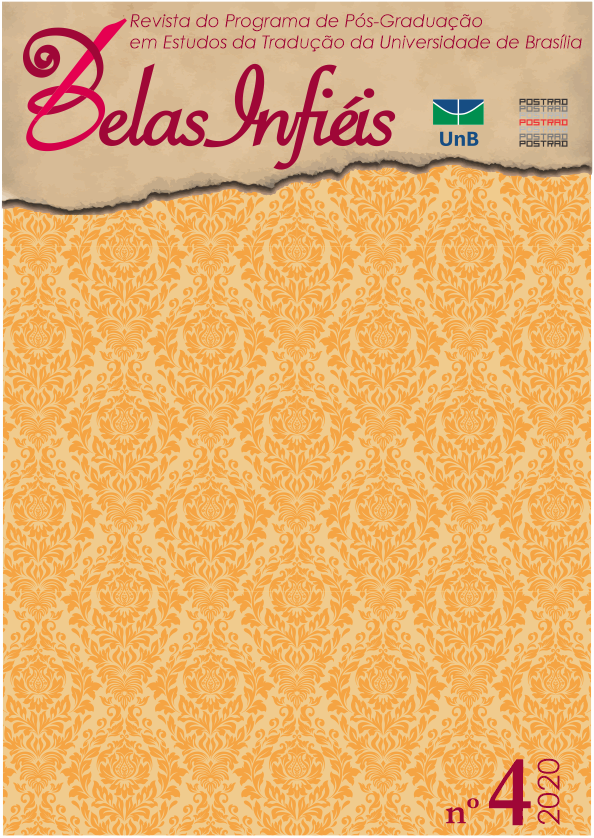The Translation of Two Websites in Universidade Federal De Uberlândia from the Perspective of Internationalization
DOI:
https://doi.org/10.26512/belasinfieis.v9.n4.2020.27494Keywords:
Websites. Translation. Internationalization. Universidade Federal de Uberlandia. Graduate program.Abstract
This article is oriented to the internationalization process at Universidade Federal de Uberlandia (UFU) and investigates two websites of graduate programs, both with English language versions. The analysis of the website translations reveals problems of linguistic, cultural and translational nature, which urge the revision and translation of several contents, as well as redesign of some visual aspects. To promote a reflection on one of the aspects of the internationalization of higher education in Brazil, namely the internationalization of its electronic websites, some proposals are made for reformulations, and considerations are put forward aiming at a reflection on the internationalization of university websites and its interface with the Translation Studies.
Downloads
References
CAPES ”“ COORDENAÇÃO DE APERFEIÇOAMENTO DE PESSOAL DE NÃVEL SUPERIOR. A internacionalização na universidade brasileira: resultados do questionário aplicado pela CAPES (2017). Brasília: MEC, 2017. Relatório.
DA SILVA, Igor A. Lourenço. An interactional expertise-based approach to specialized inverse translation. Tradução em Revista (oniline), v. 26, p. 86-98, 2019. https://doi.org/10.17771/PUCRio.TradRev.40528
DA SILVA, Igor A. Lourenço; ALVES, Fabio; SCHMALTZ, Marcia; PAGANO, Adriana S.; WONG, Derek; CHAO, Lidia; LEAL, Ana Luísa V.; QUARESMA, Paulo; GARCIA, Caio; SILVA, Gabriel E . Translation, post-editing and directionality. In: JAKOBSEN, Arnt L.; MESA-LAO, Bartolomé (Ed.). Translation in transition: Between cognition, computing and technology. Amsterdam: John Benjamins, 2017, p. 108-134. https://doi.org/10.1075/btl.133.04lou
FERNANDEZ, Rosane Augusta. Glossário bilíngue de termos institucionais para a Universidade do Estado do Rio de Janeiro. 2011. 124 f. Dissertação (Mestrado em Linguística) ”“ Instituto de Letras, Universidade do Estado do Rio de Janeiro, Rio de Janeiro, 2011.
FERNÁNDEZ-COSTALES, Alberto. Tradución, localización e internacionalización: el caso de las páginas web universitárias. 2010. 552 f. Tese (Doutorado em Tradução) ”“ Departamento de Filología Anglogermánica y Francesa, Universidad de Oviedo, Oviedo, 2010.
FOUCES, Oscar Dias. Alguns elementos para uma didática da tradução de conteúdos para a internet. Revista Abehache, [s.l.], v. 1, n. 3, p. 25-50, 2016.
KUNSCH, Margarida K. Universidade e comunicação na edificação da sociedade. São Paulo: Edições Loyola, 1992.
LORENZO, María Pilar. La seguridad del traductor professional en la traducción a una lengua extranjera. In: HANSEN, G. (Ed.). Probing the process in translation: methods and results. Copenhagen Studies in Language. Copenhague: Samfundslitteratur, v. 24, p. 21-134, 1999.
MESQUITA, Leonardo Penha. Tradução comentada de um site universitário e tutorial para uso de uma ferramenta tecnológica de apoio à tradução. 2015. 80 f. Monografia de conclusão de curso (Bacharelado em Tradução) ”“ Instituto de Letras e Linguística, Universidade Federal de Uberlândia, Uberlândia, 2015.
MIRANDA, José Antunes; STALLIVIERI, Luciane. Para uma política pública de internacionalização para o ensino superior no Brasil. Avaliação: Revista da Avaliação da Educação Superior, [s.l.], v. 22, n. 3, p. 589-613, 2017. doi: https://doi.org/10.1590/s1414-40772017000300002
SANDRINI, Peter. Localization and translation. MuTra Journal, [s.l.], v. 2, p. 167-191, 2008.
RAMOS, Agostinho Alberto Ferreira. O papel da tradução na comunicação institucional: O caso do IPB. 2015. 98 f. Relatório Final (Mestrado em Tradução) ”“ Escola Superior de Educação de Bragança, Bragança, 2015.
YUNKER, John. Building a global website. Multilingual Computing: The Global Web Guide, v. 14, n. 55, p. 4-9, 2003.
Downloads
Published
How to Cite
Issue
Section
License
Copyright (c) 2020 CC BY

This work is licensed under a Creative Commons Attribution 4.0 International License.
Given the public access to this journal, the texts are free to use but requires the recognition of the original authorship and initial publication in this journal to be properly stated.
 The journal allows the use of works published for non-commercial purposes, including the right to submit the work to publicly accessible databases. Published contributions are the sole and exclusive responsibility of the author(s).Â



















